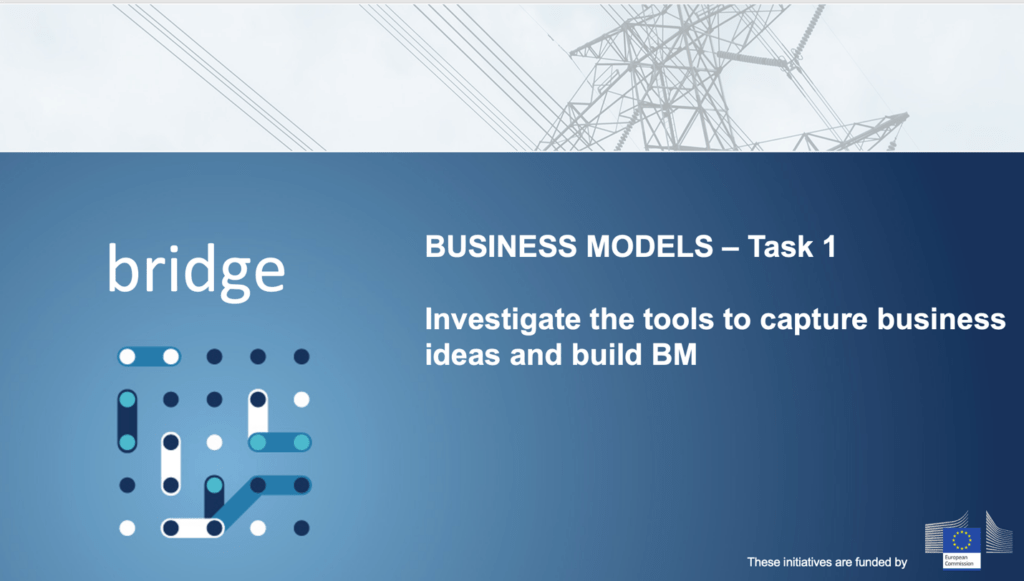OMEGA-X will clearly define the value of data for different scenarios considering views from different stakeholders and investigates different business models evaluating its economic and social impact. The definition of feasible business models is valuable to the projects to ensure the future evolution of and maintenance of the OMEGA-X results and generate business opportunities for the partners and community.
Online Course on Business Modeling
In its commitment to cultivating a culture of continuous learning and sustained growth, OMEGA-X achieved a significant milestone in October—an expansive online course dedicated to Business Modeling available on the Energy Business Modeling Tool (https://energy.venturely.io/).
This initiative is a testament to OMEGA-X’s dedication to meeting the varied needs of our dynamic community, providing an in-depth exploration of the latest strategies and methodologies crucial for driving successful business model innovation. The crafted course comprises four distinct units, each delving into essential aspects of business modeling:
Unit 1: Emerging Trends in the Energy Industry
Exploring the forefront of developments, this unit dives into the latest trends within the energy industry, equipping participants with insights to navigate the evolving landscape effectively.
Unit 2: Market Research
This unit focuses on the foundational importance of market research, offering both theoretical frameworks and practical applications to enable participants to grasp the intricacies of this essential business aspect.
Unit 3: Stakeholders and Value Creation
Delving into the intricacies of stakeholder management and the art of value creation, this unit provides a holistic understanding of how these elements contribute to sustainable business models.
Unit 4: The Art of Creating and Capturing Value
Bringing the course to a comprehensive close, this unit explores the nuanced strategies involved in creating and capturing value, synthesizing the knowledge gained throughout the course.

Each unit incorporates a blend of theoretical discourse and some practical content. To enhance the learning experience, participants are presented with a small exercise after each unit, enabling them to apply their newfound knowledge in real-world scenarios.
Enrollment for this transformative course remains open, and we wholeheartedly encourage all OMEGA-X pilot members to seize this invaluable opportunity. In an era of intense competition, staying ahead requires continuous learning, and this course is tailored to equip our community with the tools needed for success in the competitive business landscape.
Onsite Workshops on Business Model Development
In the upcoming month, January 2024, the project proceeds with hands-on workshops on the Development of Business Models, offering an exclusive opportunity for collaborative engagement and networking. These workshops have been meticulously crafted to complement the online course, providing partners with a practical and immersive setting to apply their acquired knowledge in a supportive and dynamic atmosphere.
Facilitated by partner UCP, these workshops will delve into critical facets of business model development. The agenda includes refining the value proposition, defining market segments, and crafting effective go-to-market strategies.
BRIDGE Business Models Working Group: Investigate the tools to capture business ideas and build Business Models
OMEGA-X is also active within the Business Models Working Group of BRIDGE, a European Commission initiative which unites Horizon 2020 and Horizon Europe Smart Grid, Energy Storage, Islands, and Digitalisation Projects to create a structured view of cross-cutting issues which are encountered in the demonstration projects and may constitute an obstacle to innovation.
Cláudia Antunes Marante from UCP was appointed last October as a co-task leader for Task 1 of the working group. This task is specifically focused on investigating tools for capturing business ideas and facilitating the development of business models.
The primary aim of Task 1 is to standardize tools for business model selection based on their distinct features. At present, the Task 1 team is actively engaged in designing the methodology that will guide the execution of the task.
Over the coming months, collaborative efforts with EU projects are planned to delve into key discussions on business model development. The focus will be on understanding the tools employed across projects for developing their value propositions and viable business models.
The overarching objective is to produce in 2024 a comprehensive guide that encompasses business model templates, best practices, and testimonials sourced from projects affiliated with BRIDGE. This guide aims to be a valuable resource for the community, offering insights and practical advice gleaned from real-world experiences within BRIDGE-related projects.
